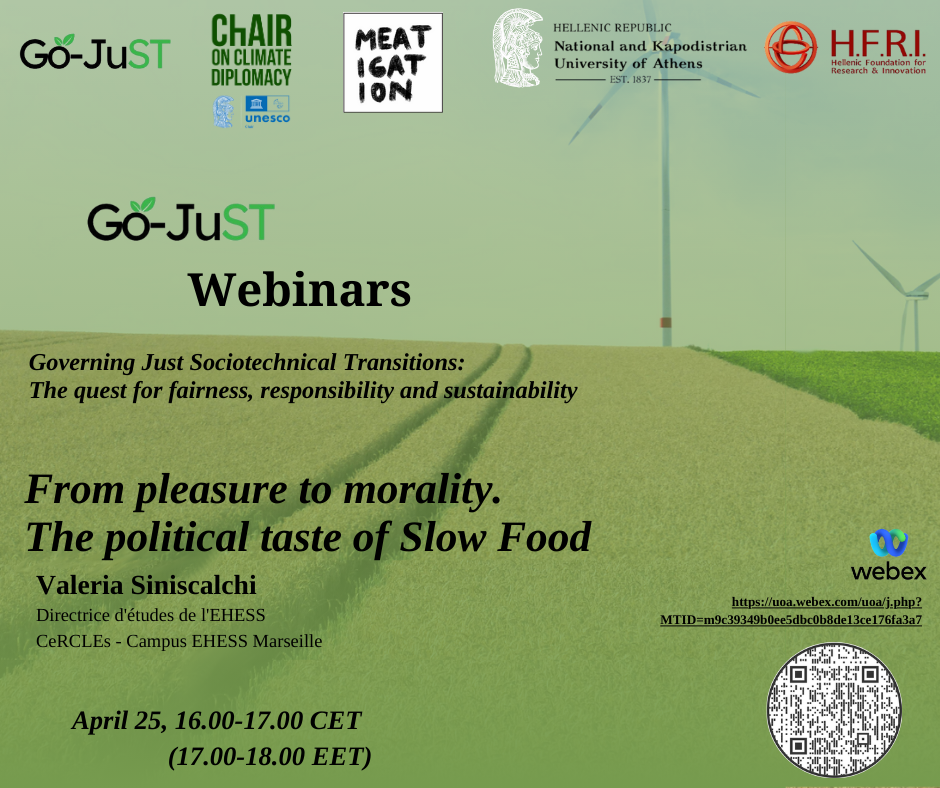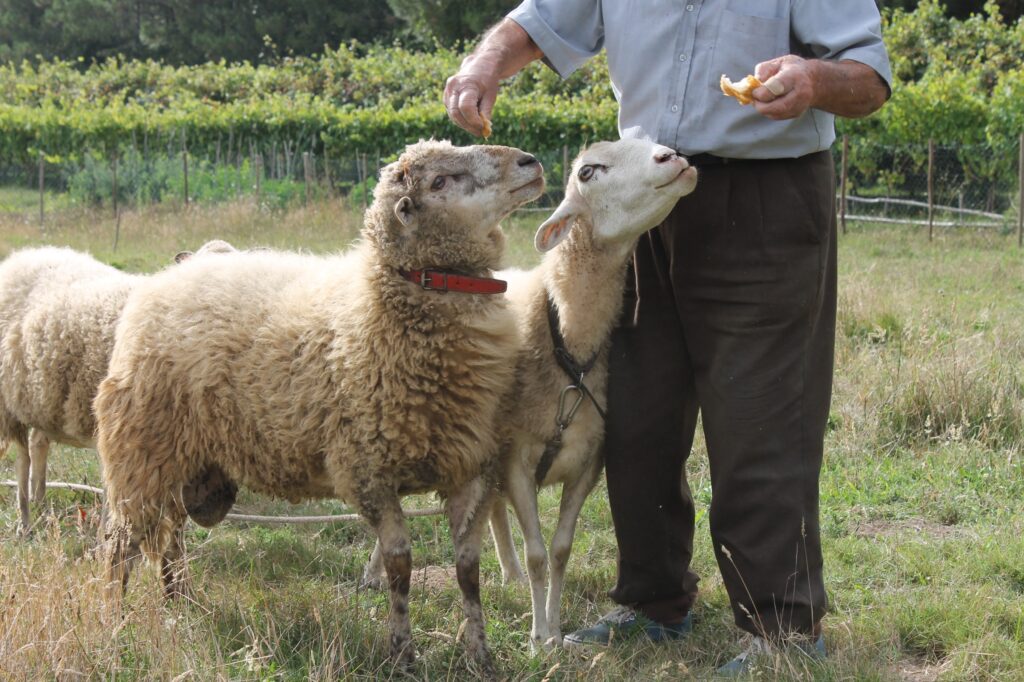This webinar series brings together different disciplinary perspectives to discuss meat, meat replacements and alternative proteins in the context of climate change and animal ethics.
Spring – Fall 2024
MEATigation is collaborating with the research project Go-JuST: Governing Just Sociotechnical Transitions led by the University of Athens, to organise a webinar series considering issues around justice, inclusion, responsibility, fairness and sustainability in agrifood transitions.

MEAT Meets! Spring 2023
Sebastian Billows and Marc-Olivier Déplaude – Legal Repair: Domesticating European Legislation on Pig Welfare
February 1, 2023
Agricultural sciences are a crucial institution of “repair”, which has fostered the development of intensive agricultural systems. Since the 1970s, such systems have been encountering new sources of fragility due to growing criticism over their health, environmental, and ethical impacts. In many cases, this has led to stricter regulations. By combining existing perspectives on agricultural science with insights from law and society, this presentation will argue that agricultural advisers (scientists, engineers, and technicians) perform legal repair. Based on a case-study of the EU legislation on pig welfare, it will show how agricultural advisers shape the regulatory process, from the emergence of new standards to their implementation.
Stathis Arapostathis – From Productive to Sustainable Chicken: Material Entanglements and Technoscience Politics in Poultry production in Greece, 1950-2020
March 22, 2023
Focusing on the case of chicken this talk studies a. the material entanglements and sociotechnical path dependencies in meat and egg production in Greece the last seventy years, b. the social and political setting that shaped the emergence of an emphasis on sustainable production and the environment the last twenty years and its appropriations from the industry. I argue that industrial based poultry emerged and shaped from 1950 to 1990 through the important contributions by farming collectives and the establishment of an imaginary that promoted the scientification and “rationalization” of production, and an emphasis on productivity. Vaccines, food additives, antibiotics as food supplements promoted by experts, farming communities, and corporate actors as the technological fixes. The fixes were introduced to respond to the quest of productivity, to the emphasis on the nutritional importance of protein for humans, and to the political priorities of self-sufficiency. I argue that sociotechnical networks and material entanglements functioned technopolitically and bounded any shift toward sustainable meat production. They configured the conceptualization of sustainability and the relevant policies the last 20 years. Sustainability in meat and egg production was promoted along process of assetization of food and the creation of niche markets and attempts to create not just commodities but products with specific identity and nutritional value. Technosciences have played key role in shaping visions and in configuring valorization of new products.
Marc-Olivier Déplaude – Scaling Up Pig Farming: Livestock Buildings as Instruments for the Rationalization of Pig Farms in 1970s France
March 29, 2023
This presentation will focus on a policy that was instrumental in reshaping pig farming in 1970s France: the “Plan for the Rationalization of Pig Production”. This policy aimed to promote the development of large pig farms, mainly through subsidies for the construction of new livestock buildings. Based on STS and anthropological research on the construction of large-scale technological systems, this presentation will explore how the scaling up of French pig farms took place. More specifically, it will examine how the French government and the pig sector handled the political, economic, environmental, and sanitary issues raised by this scalability policy.

Rebeca Ibáñez Martín – Love for a lamb of the house
May 24, 2023 (webinar was only offered LIVE)
In this talk, I will present part of my fieldwork in Galicia, in the north of Spain where a traced the human-animal relations in a small village there. I will reflect on a particular kind of love for animals that is condensed in the Spanish word gustar. The love implied in gustar stretches all the way from the attentive care for a beloved animal, to its slaughtering, its dedicated cooking, and the savouring of its meat during a festive meal.
Rebeca Ibáñez Martín is an anthropologist and Science and Technology Studies (STS) scholar. She is a research professor at the Institute of Anthropology and Ethnology of the Dutch Royal Academy of Arts and Sciences (HUC/KNAW, Amsterdam) where she leads the thematic line “Anthropology of Food, Body, and Wellbeing”. She is also a lecturer at the Department of Anthropology at the U. of Amsterdam (UvA). She studied History and Anthropology at the Complutense University of Madrid (UCM), where she obtained a master’s degree in Critical Feminist Theory. Her doctoral thesis, entitled “Bad to eat? Empirical Explorations of Fat as Food” (2014) was awarded the prize for the best thesis in Humanities and Social Sciences (U. de Salamanca). Between 2014 and 2018 she worked as a postdoc at the University of Amsterdam, joining the team led by Prof. Annemarie Mol “The Eating Body in Western Practice and Theory”. She has now several ongoing projects, around the issue of industrial food systems, exploring greenhouses multispecies relations in Spain and the Netherlands, as well as mobile livings in both countries, and industrial pig farming practices in the Netherlands.
MEAT Meets! Fall 2022
Minna Kanerva – Consumption corridors and the case of meat
October 5, 2022
The presentation will introduce consumption corridors as an emerging policy tool within strong sustainable consumption governance. Consumption corridors are applied in the context of the current meat system, a common driver for the twin global crises of climate and ecology. Firstly, the planetary health diet is linked with sustainable consumption corridors for meat. After this, two conceptual metaphors are explored as discourse tools which can support paradigm and system level change in meat. Subsequently, specific actions for bringing about meat consumption corridors will be suggested, and finally, the presentation will argue that applying consumption corridors in the meat context could serve as a bridge for increased societal acceptance of recomposed consumption more generally.
Mani Sadredini – Meat Meets the Tummy
October 26, 2022
Mani will give a brief introduction to the role of meat in health and disease. He will go through some of the science behind the association of meat consumption with various diseases. He will also present the nutritional value of different types of meat and compare it with the alternatives. Finally, Mani will clarify some of the myths related to dietary meat.
Jonas House – Insects are not ‘the new sushi’: Theories of practice and the acceptance of novel foods
November 9, 2022
Recent years have seen increased interest in ‘alternative proteins’ that provide a sustainable alternative to conventional sources of meat and milk. A prominent example is the use of insects as food. Proponents often argue that insects are ‘the new sushi’, in the sense of being a culturally unusual food in the West that can nevertheless achieve widespread popularity. This argument, I suggest, is mistaken. Based on archival research on the history of sushi in the US, and qualitative research on insect-based food consumption in the Netherlands, I explain the reasons for sushi’s success and insects’ failure in becoming popular food. This comparison, I argue, provides useful insight into why certain alternative proteins – and novel foods more broadly – may or may not become widely accepted.
Minna Kaljonen and Annika Lonkila – Pulses and plant-based proteins in food system transition
November 30, 2022
Building a more sustainable and resilient food system requires a system perspective. The systems perspective is, however, hard to remember in practice and in research. In this talk we investigate the promises and realities associated to plant-based proteins in food system transition. We call for greater attention on both changing consumption and production patterns, when investigating the transition potential of novel plant-based products and value chains. A food systems perspective is essential also when evaluating the role of food innovations in just transition.
Mieke Roscher – Becoming meat – historically
December 14, 2022
In this talk, the ambivalent meaning of meat as a product is problematized. Taking the slaughter of dogs for meat consumption in Germany and Western Europe in the late 19th and the first half of the 20th century as an empirical example, it will be shown how meat and its preparation has become subject to many different taboos, yet that these taboos are historically specific and part of a particular modernist perspective. It will be shown that a multidimensional approach that regards “becoming meat“ as a process that is not only historically contingent but also important in shaping human-animal relationships, helps to uncover the societal meaning of meat. Taking its clues from both Human-Animal Studies as well as the history of ideas, this talk explores the ambivalent discourses between living and dead animal in its historical changeability.
